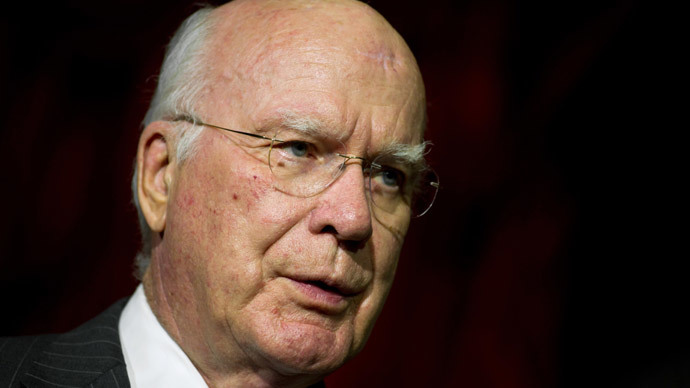Senate to vote on ending NSA’s dragnet metadata collection

United States Senator Patrick Leahy (D-Vermont) introduced an updated version of his USA Freedom Act on Capitol Hill early Tuesday and urged his colleagues to use this “historical opportunity” to reform government surveillance.
Leahy, the chairman of the Senate Judiciary Committee, first introduced his surveillance reform bill last October, and that draft passed the House of Representative in May of this year. Privacy advocates warned that the House gutted some of the most important provisions from the senator’s initial bill, however, prompting Leahy to go back to the drawing board and reintroduce the act on Tuesday this week with added language that he says will protect Americans’ personal data from eavesdropping federal agencies.
If approved, the bill will roll-back some of the surveillance authorities exposed last year when Edward Snowden, a former contractor, leaked classified National Security Agency documents detailing how the government uses certain laws to collect, among other intelligence, bulk telephony metadata pertaining to millions of innocent Americans.
Heeding concerns raised about the House got ahold of the bill, Leahy’s latest draft contains language that would require government agencies, including the NSA, to define “specific selection terms” when querying sensitive data such as call records, while also establishing new reporting requirements that intend to bring transparency to the surveillance programs currently conducted largely under lock-and-key.
“If enacted, this bill would represent the most significant reform of government surveillance authorities since Congress passed the USA PATRIOT Act 13 years ago,” Leahy said Tuesday when he introduced his bill in Washington, DC. “This is an historic opportunity, and I am grateful that the bill has the support of the administration, a wide range of privacy and civil liberties groups, and the technology industry.”
Ahead of this week’s announcement, Leahy told reporters that he has discussed his draft legislation with numerous officials from within the White House, privacy community and technology industry, and that together they were working on language “which will give our intelligence officials clear-cut guidelines, and will let the American people know that their privacy is going to be protected.”
"Chairman Leahy has done remarkable work reflecting the equities of intelligence professionals while crafting privacy enhancements, and these efforts have yielded significant progress on issues vital to those stakeholders," National Security Council spokesman Ned Price acknowledged in an email this week to Reuters.

Nevertheless, Leahy acknowledged that his bill was far from perfect. “Now it doesn’t fix every problem,” he said. “We know there is more work to be.”
“We can spend the next 20 years waiting to get 1,000 percent of everything we need. I’d like to get most of what we need, and then work on the rest,” added the senator.
Last year, an effort spearheaded by Rep. Justin Amash (R-Michigan) to defund the NSA’s spy programs came within a handful of votes from being approved in the House. In the year since Mr. Snowden first began to unveil the extent of the intelligence community’s abilities, however, Congress has come across few other options to reform the NSA.
Already, Leahy has garnered the support of 13 co-sponsors on both sides of the aisle, including Sens. Mike Lee (R-Utah), Al Franken (D-Minnesota), Ted Cruz (R-Texas) and Richard Blumenthal (D-Connecticut).
“Ultimately we, we senators and our colleagues in the other party, have the responsibility of the American people to do what is right and protect the privacy of the American people. That is why we worked hard with everyone to make sure the bill enacts meaningful reform,” Leahy said on the Senate floor on Tuesday.
On his part, co-sponsor Sen. Lee said the issues that supports of the bill hope to resolve by passing the USA Freedom Act are “neither Republican nor Democratic,” but “simply American.”
“This is a debate about Americans’ fundamental relationship with their government – about whether our government should have the power to create massive databases of information about its citizens,” Leahy said in a statement. “I believe strongly that we must impose stronger limits on government surveillance powers – and I am confident that most Vermonters, and most Americans, agree with me. We need to get this right, and we need to get it done without further delay.”
Additionally, both the American Civil Liberties Union and the DC-based Center for Democracy and Technology issued statements condoning the USA Freedom Act this week.
“We commend the Senate Democratic and Republican co-sponsors of this version of the USA Freedom Act, which significantly constrains the out-of-control surveillance authorities exposed by Edward Snowden,” Laura W. Murphy, director of the ACLU Washington Legislative Office, said in a statement. “While this bill is not perfect, it is the beginning of the real NSA reform that the public has been craving since the Patriot Act became law in 2001. The Senate bill is an improvement over the version passed by the House, but problems remain. It is important that the public understand that there is much more work to be done to narrow the government’s overbroad surveillance authorities to bring them in line with our Constitution and values. This is a marathon, not a sprint, and we have miles left to go.”
“This new version of the USA FREEDOM Act would be a significant step forward in protecting Americans from unnecessary and intrusive NSA surveillance,”added CDT President and CEO Nuala O’Connor. “The bill would end bulk collection and enact other important reforms, while also providing government with the necessary flexibility to protect national security. We encourage the Senate to pass this bill as is, and the House to quickly follow suit without weakening the bill.”
The Brennan Center for Justice, Electronic Frontier Foundation and the Reform Government Surveillance alliance—a group composed of representatives from AOL, Apple, Dropbox, Facebook, Google, LinkedIn, Microsoft, Twitter and Yahoo — have also announced their support of Leahy’s bill.














